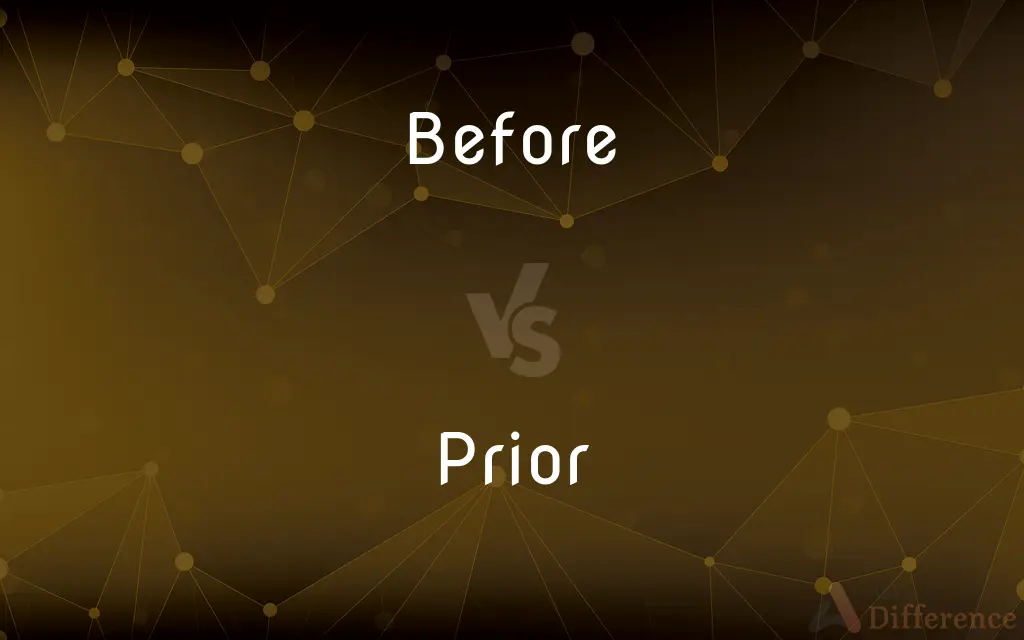Before vs. Prior — What's the Difference?
By Tayyaba Rehman & Fiza Rafique — Published on October 19, 2023
"Before" and "prior" both indicate something happening earlier in time, but "before" is more commonly used, while "prior" often feels more formal.

Difference Between Before and Prior
Table of Contents
ADVERTISEMENT
Key Differences
"Before" is a versatile word used commonly in everyday language. It signifies an earlier point in time or sequence. On the other hand, "prior" also indicates something preceding in time or order but has a more formal tone.
Using "before" can make a sentence feel conversational. For instance, saying "I met him before" feels casual. In contrast, using "prior" as in "I met him prior to the event" gives the statement a more formal vibe.
In terms of grammar, "before" can function as a preposition, conjunction, or adverb. "Prior" mainly acts as an adjective or, when combined with "to," a preposition. For instance, you might say, "Before the movie started, I grabbed popcorn," or "Prior to the movie, I grabbed popcorn."
The nuances of "before" and "prior" come into play when looking at their uses in different contexts. "Before" has a broader usage spectrum, fitting into everyday scenarios, while "prior" often appears in legal, business, or formal writing.
While both words can often be used interchangeably, their nuances in tone and usage can influence the choice based on the context. For daily, informal communications, "before" might be preferred, but for official or written documents, "prior" can be more fitting.
ADVERTISEMENT
Comparison Chart
Common Usage
Everyday language
More formal contexts
Grammatical Functions
Preposition, conjunction, adverb
Adjective, or preposition (with "to")
Tone
Conversational
Formal
Examples
Before dinner, before the event
Prior notice, prior to the meeting
Combinability
Stands alone
Often combined with "to" as in "prior to"
Compare with Definitions
Before
Earlier in time.
She called before noon.
Prior
Earlier in time or order.
She had prior experience in marketing.
Before
Rather than.
I'd resign before compromising my values.
Prior
Preceding in importance.
Your health is of prior importance.
Before
Up to the time of.
Before the 20th century, there were no smartphones.
Prior
Existing or coming before in time, order, or importance.
Prior knowledge of the subject is essential.
Before
Earlier in time
They called me the day before.
Prior
Preceding in time or in order.
The issues mentioned prior were addressed.
Before
In front; ahead.
Prior
Preceding in time or order
“[They] insist that foreign vessels seeking access obtain prior approval” (Seymour M. Hersh).
Before
Previous to in time; earlier than.
Prior
Preceding in importance or value
A prior consideration.
Before
In front of.
Prior
Usage Problem Before.
Before
In store for; awaiting
The young man's whole life lies before him.
Prior
A previous conviction or arrest
The suspect has two priors.
Before
Into or in the presence of
She asked that the visitor be brought before her.
Prior
A monastic officer in charge of a priory or ranking next below the abbot of an abbey.
Before
Under the consideration or jurisdiction of
The case is now before the court.
Prior
One of the ruling magistrates of the medieval Italian republic of Florence.
Before
In a position superior to
The prince is before his brother in the line of succession.
Prior
Advance; previous; coming before.
I had no prior knowledge you were coming.
Before
In advance of the time when
See me before you leave.
Prior
Former, previous.
His prior residence was smaller than his current one.
Before
Rather than; sooner than
I will die before I will betray my country.
Prior
(colloquial) Previously.
The doctor had known three months prior.
Before
Earlier than (in time).
I want this done before Monday.
Prior
A previous arrest or criminal conviction on someone's record.
Before
In front of in space.
He stood before me.
We sat before the fire to warm ourselves.
Prior
A prior probability distribution, one based on information or belief before additional data is collected.
Before
In the presence of.
He performed before the troops in North Africa.
He spoke before a joint session of Congress.
Prior
A belief supported by previous evidence or experience that one can use to make inferences about the future.
Before
Under consideration, judgment, authority of (someone).
The case laid before the panel aroused nothing but ridicule.
Prior
A high-ranking member of a monastery, usually lower in rank than an abbot.
Before
In store for, in the future of (someone).
Prior
(historical) A chief magistrate in Italy.
Before
In front of, according to a formal system of ordering items.
In alphabetical order, "cat" comes before "dog", "canine" before feline".
Prior
Preceding in the order of time; former; antecedent; anterior; previous; as, a prior discovery; prior obligation; - used elliptically in cases like the following: he lived alone [in the time] prior to his marriage.
Before
At a higher or greater position than, in a ranking.
An entrepreneur puts market share and profit before quality, an amateur intrinsic qualities before economical considerations.
Prior
First, precedent, or superior in the order of cognition, reason or generality, origin, development, rank, etc.
Before
At an earlier time.
I've never done this before.
Prior
The superior of a priory, and next below an abbot in dignity.
Before
In advance.
Prior
A chief magistrate, as in the republic of Florence in the middle ages.
Before
At the front end.
Prior
A prior conviction; - said of an accused criminal.
Before
In advance of the time when.
Prior
The head of a religious order; in an abbey the prior is next below the abbot
Before
(informal) Rather or sooner than.
I'll die before I'll tell you anything about it.
Prior
Earlier in time
Before
In front of; preceding in space; ahead of; as, to stand before the fire; before the house.
His angel, who shall goBefore them in a cloud and pillar of fire.
Prior
Former.
His prior attempts were unsuccessful.
Before
Preceding in time; earlier than; previously to; anterior to the time when; - sometimes with the additional idea of purpose; in order that.
Before Abraham was, I am.
Before this treatise can become of use, two points are necessary.
Before
An advance of; farther onward, in place or time.
The golden age . . . is before us.
Before
Prior or preceding in dignity, order, rank, right, or worth; rather than.
He that cometh after me is preferred before me.
The eldest son is before the younger in succession.
Before
In presence or sight of; face to face with; facing.
Abraham bowed down himself before the people.
Wherewith shall I come before the Lord?
Before
Under the cognizance or jurisdiction of.
If a suit be begun before an archdeacon.
Before
Open for; free of access to; in the power of.
The world was all before them where to choose.
Before
On the fore part; in front, or in the direction of the front; - opposed to in the rear.
The battle was before and behind.
Before
In advance.
Before
In time past; previously; already.
You tell me, mother, what I knew before.
Before
Earlier; sooner than; until then.
When the butt is out, we will drink water; not a drop before.
Before
Earlier in time; previously;
I had known her before
As I said before
He called me the day before but your call had come even earlier
Her parents had died four years earlier
I mentioned that problem earlier
Before
At or in the front;
I see the lights of a town ahead
The road ahead is foggy
Staring straight ahead
We couldn't see over the heads of the people in front
With the cross of Jesus marching on before
Common Curiosities
Can "before" and "prior" be used interchangeably?
Often, yes, but "before" is more common in everyday language, while "prior" is more formal.
Can "before" function as an adverb?
Yes, "before" can function as a preposition, conjunction, or adverb.
Which word fits better in formal writing?
"Prior" is often more suitable for formal writing.
Does "prior" always need "to" to function as a preposition?
Often, "prior" is combined with "to" to function as a preposition, but not always.
How does the tone differ between "before" and "prior"?
"Before" has a conversational tone, while "prior" feels formal.
Is "prior" commonly used in legal contexts?
Yes, "prior" is often found in legal, business, and formal writings.
Do both words have roots indicating "coming before" in time or order?
Yes, both words indicate something that comes earlier in time or sequence.
Can "before" be used to indicate preference?
Yes, as in "I'd quit before betraying a friend."
In which situations is it best to use "before"?
"Before" is best for informal communications and when indicating time, place, or preference.
When would you recommend using "prior"?
"Prior" is ideal for formal contexts, especially when indicating something preceding in time or order.
Which is more versatile in grammatical functions, "before" or "prior"?
"Before" is more versatile, functioning as a preposition, conjunction, or adverb.
Can I say "prior the event" instead of "prior to the event"?
No, you should use "prior to the event."
Can "before" indicate a place, not just time?
Yes, as in "He stood before the judge."
Can "before" be used to signify "in the presence of"?
Yes, as in "He spoke before the council."
Is "prior" used to denote importance?
Yes, as in "Safety is of prior importance."
Share Your Discovery

Previous Comparison
Private Finance vs. Public Finance
Next Comparison
IMF vs. World BankAuthor Spotlight
Written by
Tayyaba RehmanTayyaba Rehman is a distinguished writer, currently serving as a primary contributor to askdifference.com. As a researcher in semantics and etymology, Tayyaba's passion for the complexity of languages and their distinctions has found a perfect home on the platform. Tayyaba delves into the intricacies of language, distinguishing between commonly confused words and phrases, thereby providing clarity for readers worldwide.
Co-written by
Fiza RafiqueFiza Rafique is a skilled content writer at AskDifference.com, where she meticulously refines and enhances written pieces. Drawing from her vast editorial expertise, Fiza ensures clarity, accuracy, and precision in every article. Passionate about language, she continually seeks to elevate the quality of content for readers worldwide.










































